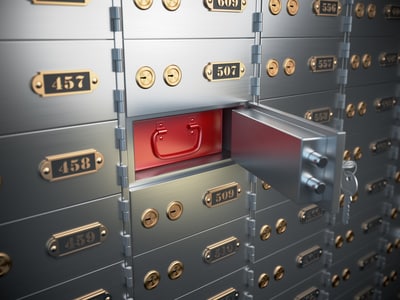As a child, I remember well my mother taking me to the bank in our small town. The bank was more than a place for money; it was a center for a social meeting, a place you would see your friends, a place to visit and grab the latest news. When I explained to my mother that her money was not actually (physically) in the bank, she didn’t believe me. The concept that money moved to a central depository every night and then back again the next morning was beyond her comprehension.
We have now moved to a digital world, the physical way of doing business has moved to our iPhone and computers. The evolution of how we live has moved everything along.
We do still use a bank for one physical benefit; we still use a Safe Deposit Box and the bank for physical assets we wish to keep safe. Storage and safekeeping of critical tangible assets are essential, a need for protection of valuables, important papers or some future evidence of ownership or heritage.
A storage box is just a physical box locked in a safe and secure vault. The customer has a key, the bank has a key, and when both are produced, the contents are available to the box owner. Simple, safe and secret. Evolution has also reached safe deposit boxes; now, many banks offer a keyless entry for the safe deposit box owner, even safe deposit boxes have migrated to a digital entry.
Like many things that change as the population ages, more than half available safety boxes are lying empty, an example of the millennials using their form of safety, digital lockboxes.
What would be a good choice for storing and keeping in a safe deposit box at the bank?
• Birth certificates
• Deed of title to land
• Car titles
• US Savings Bonds
• Heritage items
• Passports
Generally, a safe deposit box is not an excellent choice for wills because the deceased person may be the only access to the safe deposit box. Valuable jewelry might not be a good choice for a safe deposit box because the bank offers no insurance on the contents. Jewelry placed in the safe deposit box should have their own insurance protection.
Banks charge fees for renting a safe deposit box, generally from $20 to more annually.
For more information, visit the FDIC website.



